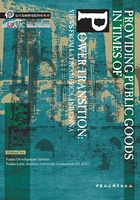
Regional Politics in the Labyrinth of the Three Minotaurs
These three discourses could be described as different semantics of modernity,derived from historically specific experiences generated throughout the colonial and postcolonial history of Latin America.“Semantics” in the understanding suggested here are simply “ideas and concepts with generalized meanings” which inform social systems about themselves,being “intransparent for themselves in their operations” (Jaeger,2010).Semantics related to the actually occurring operations of,for example,political systems in a flexible,non-deterministic way—they may behave as a mere reflection of the normal functioning of a given social structure,as “self-description”,but they may also impact the“actual”operating of the former (Stä-heli,1997).This second type of process is exactly what to expect,in different terminology,when I suggested in the introduction that in the contemporary situation,Latin American regional politics might be impacted more by regional norms rather than by structural or “ma-terial” factors (cf.also Maldonado and López,2017).However,the individual discourses should not be identified—as norm constru-ctivism in International Relations might be prone to—with different classes of discrete “political actors” or “expert networks” (Schmidt,2017).As described above,they are much more likely to coexist in the speech of individual actors,being used in different situations and for different audiences—altogether a more complex panorama than in approaches that identify discourses with political groupings expre-ssing their affiliations through them.
In this context,it is both interesting and perhaps relevant for understanding present and possible future developments that Briceño conceptualized the three discourses not as basically independent possibilities of social identity construction,but rather as heavily interdependent and often conflicting spheres of meaning—thereby also defecting from more traditional anthropomorphic analogies of the social (cf.Luhmann,1992).It is not,on a more structural level,the individuals,organizations or states making up Latin America that come into conflict about possibilities of social evolution,concrete political decisions and other points.Rather,the three discourses themselves that are clashing in terms of “parasitizing and obstructing each other in a tragic combat without victory” (Briceño,2014).They may also function in synergy in some instances—for example,the political rhetoric of populist leaders may perform a “syncretism of the European,Hispano-Catholic and aboriginal mentalities” (Nahon-Serfaty,2017).According to Briceño (2014),however,such harmony is a rare occurrence—rather,the fundamental incompatibility of the discourses and their unsustainable normative demands under con-ditions of modernity lead to a proto-cyclical dynamic in Latin Ameri-can societies.Grand rationalist designs,derived often from the intelle-ctual fashions of global metropolises,encounter the complexities and intrigues of status-driven hierarchic “mantuano” networks.The resulting frustrations then fan the resentment of savage discourse,which feeds on the existing paradoxes to immobilize social relations in a state in which they might again become receptive to grandiose rationalist plans of salvation.
It is suggestive,at least,that analysts of US-Latin American relations also see a cyclical dynamic at work,and furthermore,one in which the North does not seem to be firmly in charge.Rather,the autochthonous structures of Latin American societies seem to sometimes generate both openness to external engagement as well as inexplicable “backlash” to the former (Vargas-Alzate,2016).In the same vein,it appears that the rhetoric associated with different regio-nalist projects can be seen to conform in each case to one of the discourses presented by Briceño Guerrero.While,for example,the Pacific Alliance conforms closely to rationalist “universal moder-nism”,ALBA-TCP is associated with a proto-savage rejection of and resentment towards behavioral impositions associated with liberal global governance.Other projects,such as Mercosur,appear to be more compatible with the latter and Western modernity,but also display notions of informal authority and hierarchy that seem to be derived rather from “mantuano” ideas (cf.Kleinschmidt and Gallego,2017).Recent research regarding more specific policy orientations of Mercosur at least partially validates the supposition that implicit cultural orientations play a large role in their formulation (Peixoto and Perrotta,2017).The same research also seems to suggest that a certain institutional openness towards different normative criteria may facilitate the survival of regional institutions in the context of chan-ging discursive orientations,as assumed in this chapter.
Perhaps,if the cyclical dynamics indeed function as suggested above,and also do so at the regional scale,the seemingly inexplicable and dysfunctional affirmation of pseudo-traditionalist hierarchical orders in the sphere of gender and race—as is evident for example in the speech of the current Brazilian government (Hunter and Power,2019)—may be an indication that the universalist,rationalist,neoliberal or social democratic projects have come to an end,and will now increasingly be challenged by interpersonal and hierarchic models of political ordering.If the discourse model described above is applied in a consequent fashion,the current left-right polarization evident in the region should be seen as an ephemeral and superficial phenomenon driven by a deeper incompatibility between rationalistic and “mantuano” reasoning.
While obviously not an attempt at nomothetic explanation,these reflections might at least illustrate the possibility of the existence of regional,quite idiosyncratic patterns of meaning and normativity that can generate considerable uncertainties for outside actors not attuned to the highly specific,interlocking,postcolonial narratives.While in some historical cases overlaid by external ideological,economic or power dynamics,it seems that in the contemporary situation,the pluriverse of competing discourses is able to unfold largely on its own terms,producing the“regional world”expected by many.Yet,the seeming lack of coherence,as well as its conceptual distance from conventional International Relations theories,might confuse many scholars coming from more Eurocentric approaches.This problem might justify this attempt of consulting a regional classic of cultural theory hitherto unnoticed in International Relations.